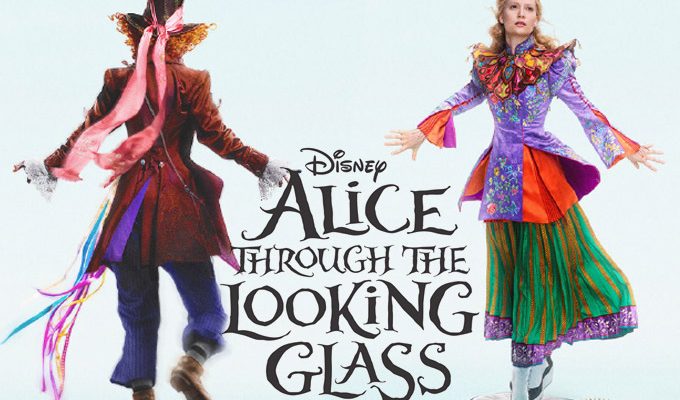The Hatter (Johnny Depp) is less mad than sad in “Alice Through the Looking Glass,” and that’s also true of the film itself, a pitiful sequel that decisively sullies any goodwill one might have felt for these Disney-fied versions of Lewis Carroll’s famed characters. Director James Bobin (“The Muppets”) wholeheartedly mimics the computerized style of Tim Burton’s predecessor, meaning this second modern go-round in Wonderland resembles a frenzied fantasia of rainbow-hued colors, baroque architecture, overly ornate sets, and a general visual detachment between live-action foreground and digitally constructed background imagery. In short: it looks like those old “King’s Quest” PC adventure titles coated in CG Skittles vomit.
The off-putting aesthetics of ‘Looking Glass’ are complemented by an equally putrid tale that’s determined to make its protagonist loathsome. Now a ship captain braving the high seas and its dastardly pirates (albeit not Depp’s Jack Sparrow), Alice (Mia Wasikowska) finds herself again contending with sexist former fiancé Hamish (Leo Bill), who wants to buy her father’s boat and, in doing so, confine the feisty feminist to a lowly clerk job. Disgusted by this misogyny, Alice is visited by caterpillar-turned-butterfly Absolem (the late Alan Rickman), who guides her to a mirror into which she enters. Hence she’s transported back to Wonderland, in a would-be transcendent moment that, like so much of the action, is undercut by over-baked shiny-swirly-hallucinatory effects that reek of overkill.
 Back on familiar trippy ground, Alice discovers that the Hatter has fallen into crushing despair after recovering a childhood memento that reminds him of his family, who were killed years earlier by the Red Queen’s (Helena Bonham Carter) Jabberwocky. To fix this state of affairs – which the White Rabbit (Michael Sheen), Cheshire Cat (Stephen Fry), Tweedledee and Tweedledum (Matt Lucas), and the incessantly hand-twirling White Queen (Anne Hathaway) all view as catastrophic – Alice journeys to the castle of Time (Sacha Baron Cohen). That half-man, half-mechanical immortal keeps his Great Clock running with a Chronosphere doo-dad that Alice can use to travel back to the past, where she believes she can save the Hatter’s parents from death and, in doing so, cheer him up in the present.
Back on familiar trippy ground, Alice discovers that the Hatter has fallen into crushing despair after recovering a childhood memento that reminds him of his family, who were killed years earlier by the Red Queen’s (Helena Bonham Carter) Jabberwocky. To fix this state of affairs – which the White Rabbit (Michael Sheen), Cheshire Cat (Stephen Fry), Tweedledee and Tweedledum (Matt Lucas), and the incessantly hand-twirling White Queen (Anne Hathaway) all view as catastrophic – Alice journeys to the castle of Time (Sacha Baron Cohen). That half-man, half-mechanical immortal keeps his Great Clock running with a Chronosphere doo-dad that Alice can use to travel back to the past, where she believes she can save the Hatter’s parents from death and, in doing so, cheer him up in the present.
Alice thus sets out on a mission that puts the very fabric of the universe in perilous jeopardy, all so she can lift her comrade’s spirits – rather than, you know, just expecting him to cope with his decades-old grief. To say that this motivation is the height of misguided-priorities recklessness would be a vast understatement, and it renders ‘Alice’ an infuriating affair that imparts a moronic (and, to younger viewers, wrongheaded) message about unreasonably prioritizing yourself and your friends over everyone else, even at great apocalyptic risk. Meanwhile, an eventual revelation regarding the Red Queen’s origins come across as a “How the Grinch Stole Christmas”-grade miscalculation, providing a pop-psychology explanation for her evil that has the unintended consequence of rendering the iconic head-enlarged villain painfully pedestrian and small.
 Just as in “Alice In Wonderland,” much of ‘Looking Glass’ involves Wasikowska running, jumping, sliding, swinging, falling, and bouncing around artificial environments into which she’s been unconvincingly integrated. While Disney apparently believes this green screen-heavy approach to be the future of cinema – a notion bolstered by the success of its recent, superior “The Jungle Book” – Bobin’s sequel suggests otherwise, replete with in-your-face 3D that further accentuates the detachment between visual planes. It is, quite simply, an unpleasant film upon which to gaze, so that even its few inventive sights, such as a cloud-filled room full of dangling pocket watches that represent the time each man and woman has left in life, boast an unwelcome garishness.
Just as in “Alice In Wonderland,” much of ‘Looking Glass’ involves Wasikowska running, jumping, sliding, swinging, falling, and bouncing around artificial environments into which she’s been unconvincingly integrated. While Disney apparently believes this green screen-heavy approach to be the future of cinema – a notion bolstered by the success of its recent, superior “The Jungle Book” – Bobin’s sequel suggests otherwise, replete with in-your-face 3D that further accentuates the detachment between visual planes. It is, quite simply, an unpleasant film upon which to gaze, so that even its few inventive sights, such as a cloud-filled room full of dangling pocket watches that represent the time each man and woman has left in life, boast an unwelcome garishness.
The same holds for the performances, which range from Wasikowska’s bland turn as the non-descript Alice – whose independent-woman attitude has no bearing on her Wonderland quest – to Hathaway’s cartoonish airiness, to Bonham Carter’s screamy hysteria and Depp’s lisping foppishness. Even more than before, Depp’s Hatter comes across as a crazy-haired creep in tattered clothing, and he’s given so little to do in ‘Looking Glass’ that, aside from serving a basic narrative purpose, his presence is perfunctory. Cohen, meanwhile, affects a bizarre Werner Herzog-ian German accent as the buffoonish Time, but his verbal inflections are, like the rest of the film’s embellishments, grandiose to the point of grating – and help turn this adventure into a monumental waste of life’s most precious (and fleeting) commodity. [D]

